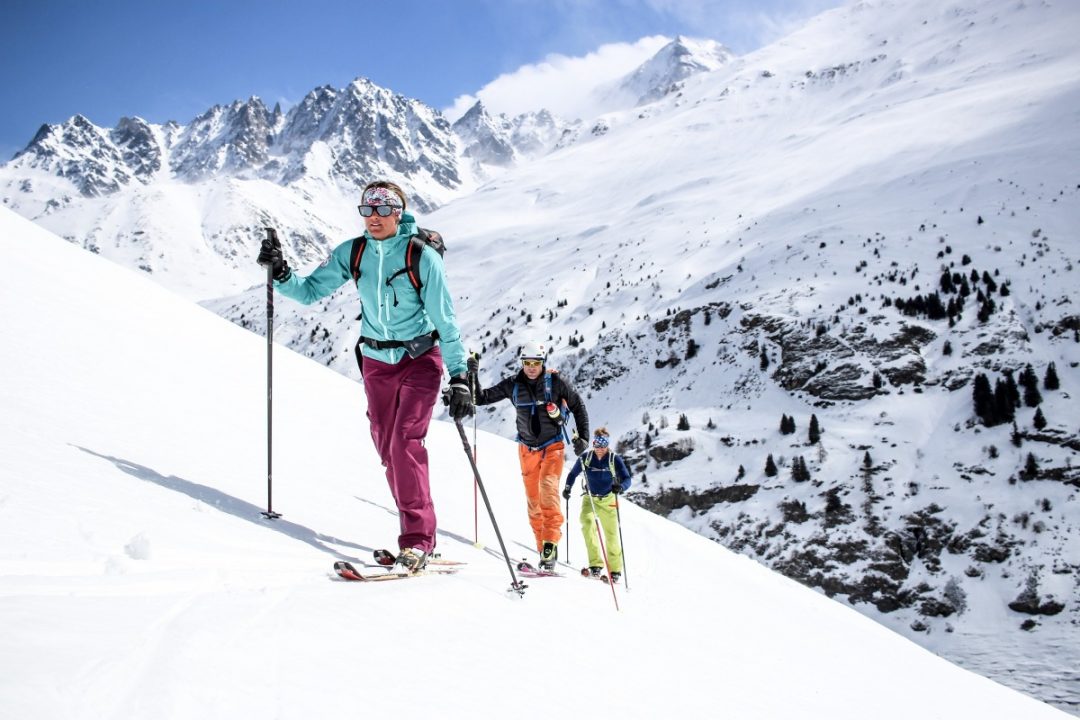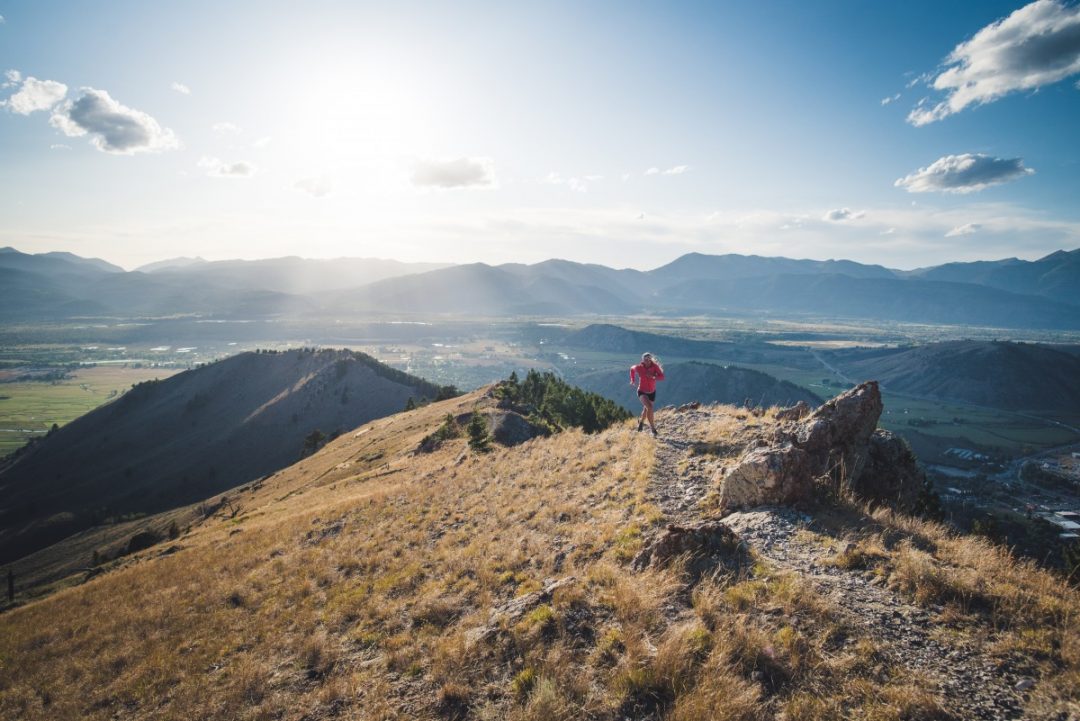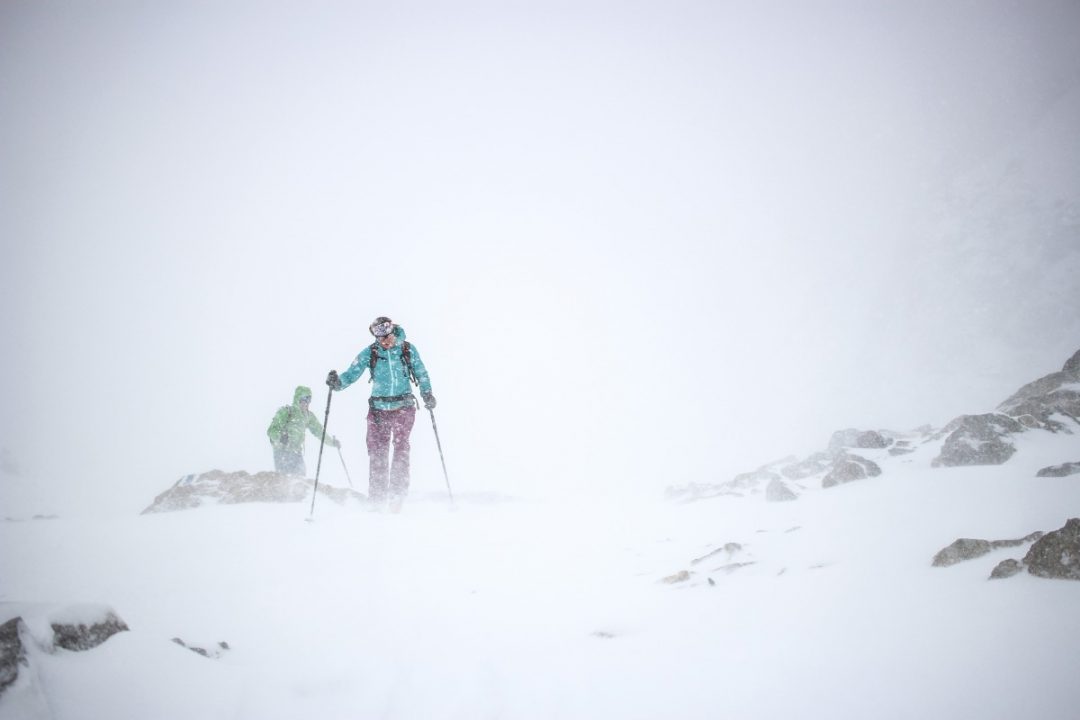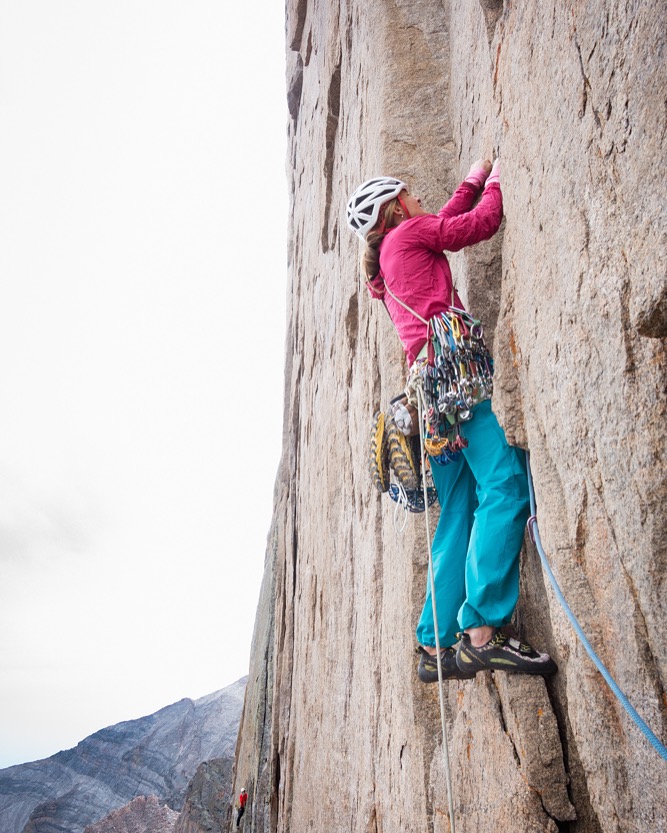
Janelle Smiley was part off a team that crossed the Alps on skis in 36 days.
Last month after an early winter move from Jackson, Wyoming to Revelstoke, Canada we connected with a busy Janelle Smiley. For those who may be unfamiliar with Smiley, she’s represented the U.S. at the ISMF World Championships numerous times, been a North American ski-mo champion, and, for years, showed up and crushed. Smiley’s repertoire includes technical climbing skills too, illustrated by her and husband Mark’s project to climb the fifty classic climbs in North America.
This interview is mainly about Smiley’s ideas on risk, living a fulfilling life, and how it all works with the added puzzle piece of two children. The interview has been lightly edited for clarity and length.

Smiley is a multifaceted athlete who simply enjoys moving fast in the mountains: running or skiing.
WildSnow: We’re sitting in a deep high-pressure system now. I think I’ve heard a new scientific term, which is a ridiculously resilient ridge or RRR, to describe what we’re experiencing.
Janelle Smiley: I was just in a Canadian hut for the last seven days and came out yesterday. We had a powder refresh every day. So much powder we had to ski low-angle trees the whole time because of the avalanche danger.
WildSnow: One of the things I wanted to talk to you about is the perspective of being a mom and planning a family and how you’ve seemed, at least to me, to balance your passions of being in the mountains. You have two children, correct?
JS: I have a little girl turning three next week and a 9-month baby boy.
WildSnow: I recall several years ago, you and Mark were coming off your own version of the Fifty Project, as you were attempting to climb the fifty classics. You were moving into a new phase of your life; what were the discussions like about bringing kids into your world and maybe discussing what risk might look like or what even a day out might look like adventuring?
JS: We had the opportunity to go back to the Middle Triple Peak in the spring of 2018 to keep pushing the 50 classic climbs project. At this point, we had attempted them all. Several of them took a few attempts to reach the summit. There were just two left that we had not summited. And these two seemed to want to kill; the objective hazard on these last two routes is extremely high. It crossed our minds we might die trying to finish this project. Should we do it? Should we not? We didn’t really know.
As we decided to go back or not, we got this opportunity to ski across the entire European Alps. We could join this team of athletes and do something new, different, exciting, or we could go back to two peaks where we had been, and the likelihood of success was grim. It was an easy decision.
We joined the international team to cross the Alps. At about that time, we thought of having a family, but with this opportunity, the family had to wait another eight months or so. I was 36 at the time when we decided to cross the Alps. Crossing the Alps was an incredible experience. I’m so glad we chose to do it instead of possibly just sitting in a tent waiting for weather on a mountain we knew we didn’t have a good chance of success. It was also pretty neat how the Alps traverse built upon what we learned climbing the 50 classics. We needed a deep skillset to keep the confidence to keep going. That traverse was the hardest thing I have ever done, until giving birth…. Haha. When we got home, we were in incredible shape. I thought we would be able to run up the Grand Teton with ease and do all these fun lines really fast.
But the reality was I was really tired, exhausted really. We did go up to Grand Teton about a week after we returned. Once I got to the top, I just sat there. I didn’t have it in me to do another jump turn on high-consequence terrain. I was just too tired. My buddy Matt looked at me and started laughing; he had never seen me so tired with no motivation.
I said something like, “I’m physically tired. I’m mentally tired. I just don’t have the energy to try right now”. I took a little break from athletics. I was just so emaciated and tired. I decided to see if a baby was in the cards, and I got Insta pregnant. I thought I had time, and I wasn’t super convinced I wanted kids anyway, I cried. I kept skiing through my pregnancy until my daughter’s birthdate in February.
WildSnow: Talk about the concept of disruptors. Kids tend to disrupt and make us reprioritize instantly. How did that evolve for you?
JS: I decided that my life would not change after having her, and I was pretty adamant about that. I was now 37 and still had quite a bit of ego and ambition. I got back in shape, and we went over to New Zealand, and we skied the East Face of Mount Cook. We brought a friend to take care of our daughter while we flew into the hut and skied the route. I remember going up the East Face being like, “what am I doing? I’m a mom. This is insane. I shouldn’t be doing this. I shouldn’t be putting my life on the line.”
It was a no-fall zone with high consequences. I had the worst time trying to boot pack up this mountain, knowing that my daughter was back in town. Then something inside of me shifted. I recall thinking; I’m the only girl out here right now; I’m probably the only mom who’s ever skied this face. I don’t know if that’s true or not; I didn’t do any research. But once I made that mental shift, everything changed, and I was filled with energy. “I know how to ski. This is not unique or foreign to me. We’re gonna get this done.” I thought about what I wanted to model for my daughter. I want my daughter to be someone who achieves her goals and goes after what she wants. I heard it said, “kids become what they live” so this mom will continue to be someone who is passionate about achieving her dreams and goals, who’s also living her passion.
We had a fantastic ski descent. It was a powerful mental shift—my mind went from being in fear to being in a place of inspiration, all caused by my love for my daughter.

Smiley’s life philosophy involves living intensely both as a parent and mountain traveler.
The following winter was filled with skiing. We set the goal of skiing a 10,000 ft day each week, that way, if the conditions were bad, we could still justify hiring a babysitter; this helped us keep motivated and in good shape.
We opened up the idea of getting pregnant again, and baby Luka showed up. Now with two kids, it’s not as simple. Two is way more than double; it really changes the family dynamic.
About a month ago, I was skiing a couloir on Mark’s birthday called Forever Young on Rogers Pass outside Revelstoke, BC. It’s not gnarly, it’s about a 55-degree slope. We found it in firmer conditions. Since I didn’t ski last year because I was pregnant, I had lost quite a bit of my confidence. I’m at the top and I take a sidestep. I talked myself through it, “jump turn,” “sidestep,” “jump turn,” “sidestep…”
I ended up side stepping down a good portion of the upper couloir, for I had the image of my little daughter hanging on my leg when I walked out that morning saying, “don’t go.” I struggled to get her voice out of my head while I was at the top of this couloir.
Maybe a third or fourth of the way down, I decided I remembered how to do this. I remembered it was fun. I had another mindset shift and skied the rest of the way down. Confidence and competence are rather entangled.
I’ll admit I’m still trying to find that balance of pushing my own limits, doing what I love, and having two kids. I really like them and enjoy being with them.
WildSnow: This is not where I intended to go. But, I want to bring it up because it’s timely for me. I’ve not seen Max Lowe’s documentary yet. I’m of that generation that could be climbing in Montana and see his father Alex Lowe back in the day. So it’s interesting for me now; I’m in a place where I have a 19-year-old charging around in the mountains. I’m not ready to see the film from a parent’s perspective and have a kid taking measured risks. I get it. I’m the one who exposed him to these experiences, but I also know what can happen in the mountains. In Max’s film, there’s some heavy stuff—children losing a parent and how a family lurches and carries on. So, have you seen that documentary, or have you thought about it at all?
JS: I read her book (Forget me Not, Jenni Lowe-Anker) when it came out a while ago. That was actually a big reason why I didn’t want to have kids, because of my and Mark’s lifestyle. I didn’t want to be a single parent or leave a kid or now two at home. This reality definitely played into our decision to wait to have kids. I was 37 and 39 when they were born.
But here’s my rebuttal: Right when COVID hit, everybody was scared of going and seeing their parents, they were afraid to get them sick, and possibly die. That fear was pretty rampant.
During that period, my parents invited us to visit them in Colorado. After Jackson, WY lifted their stay-at-home ban. We drove down to Ouray and spent three weeks there. It was easy living with the grandparents. They watched Sayla while we skied various mountain lines in the morning. Then in the afternoons, I helped in the yard or went for a run. It was a special sacred time.
Two weeks later, my dad was out in the neighborhood, mitigating some deadfall. There was a big wind event that caused many trees to block the neighbors’ driveways. He was helping to remove the trees when from about 150 feet away, a tree broke due to a wind gust. The tree ricocheted off two other trees and came down between two additional trees where my dad was standing. My dad was hit on the head and died.
To me, that was a sign we’re not in charge of our life. We’re not in charge of when we go. Yes, we have the ability to take our lives by certain decisions we make. But in general, we’re here to do the work we need to do until it’s our time to go. For me, that was a confirmation to live a full life. We can go out and push our abilities; we can follow big ski lines or other dreams. But at the end of the day, it might just be a tree that falls in the middle of a forest that takes us out.
That experience combined with what happened right before I got married, has helped me to look at life lightly with respect that we do not have control. Three days before our wedding, Mark was climbing a tree collecting golden aspen leaves to put on the aisle. One of the branches broke. He fell and landed right between two giant rocks. If he would have been three inches left or right, up, or down, he would have broken his back but he didn’t.
There have been little reminders of the reality we lack control throughout my life. We can’t live in fear, we have to live to the full capacity of what we’re given. We don’t know when that cornice breaks, you’re not in charge of when you have a brain aneurysm, you’re not in charge of when that drunk driver swerves, we can’t control that at all. That’s what’s given me peace with my pursuits in the mountains and my pursuits just in life because I want to live a full, deep life regardless of how long that is. I want to demonstrate that and live that out to inspire my kids, my family, whoever else might be looking.

Time for rope work during the Alps ski traverse.

As part of her well-rounded love affair with the mountains, Smiley gravitates towards the walls too.
WildSnow: See, I need some therapy. It really is my older one simply living his life, and, as you say, it’s kind of out of our control. But I’m still grappling with it all. It’s good to hear you talk about it as a parent of two young kids.
JS: It’s a person’s right; you have to live your best life, so to speak.
WildSnow: I’m curious. And, you know, as I’m listening to you, and maybe I did ask Mark this when I spoke to him several months ago, but I don’t know, and I’m sure I have some work to do in this arena but do you feel like the questions I’m asking get asked more to moms than dads?
JS: Yes, I do. I say, and I think that’s okay. You know, moms are the life source of the children the first couple of years. You know, if dad disappears, the kid can still thrive, right? Because mom feeds and nurtures. But I think as the kids get older, it starts to balance out a lot more. And also, the woman takes the brunt by having her body out of commission anywhere from a year to two years to three, who knows, depending on how quickly you bounce back. I think it’s a huge sacrifice for the female. It is a much bigger question for the woman than for the man because Mark’s life hasn’t changed in the same ways as mine. He doesn’t have these hormones surging through him; he doesn’t go through the process of giving birth and breastfeeding and then getting back out in the mountains and wondering if he still has the confidence to make a jump turn. My body got wrecked. And it’s like, can my body even do this? I don’t even know, but I have to relearn and re-trust my body.
Losing a life in the mountains, it’s equal; both are devastating and not something anybody wants to have to go through. But it’s interesting, with that being said, this leads me to think of the hut trip I was just on that I told you about.
I went with a group of women who are an incredible group; strong, great people. But it was also at a much slower pace than I’m used to. We’re out for seven hours, and we do 3000 or 4000 vert. That’s just not what I’m used to. It’s funny because I had a great time with these women. I learned a bunch about myself, and I learned a bunch about what was important to me. And I also recognize that that pace is also not me. I can’t do that. That is not my future. I still need to push myself. I still need the bigger days, and I still desire to go at a higher level than that.
It just showed me a lot of information—It’s not good, it’s not bad. It just is; I like doing big days. I like doing things that get my attention and finding that balance. I can’t say I have completely found it. But I am trying to work out what that looks like.
WildSnow: I’m not transcribing this in real-time. But I think you said something like, “you know, that’s not my future.” Something to that effect. What do you see as your future in the sport? Or the lifestyle? I mean, it’s all a little more encompassing, if that makes sense.
JS: Thinking about the summer and what’s to come, there’s a really neat mountain that both Mark and I flew over going to separate huts on separate trips. It looks super unique and really fascinating. So we want to fly out there, you have to take a helicopter, set up a base camp for three days, and ski a couple of lines; that’s sort of on the calendar for March. And then come the summer, I think just having kids, for me running and doing running events is much easier than trying to do big climbing objectives just because of the time and the confidence and experience you need. So running seems to be a good compromise from my alpine pursuits for this season, considering my life with two young children.
But I had a thought because you say you have your 19-year-old son. And there’s a quote that comes from Sherlock Holmes that’s really kind of interesting, but I find myself telling myself quite often; “why worry, then you suffer twice?”
WildSnow: Yeah, it’s true. See, I told you I needed some therapy. I think, you know, it’s part of just what I’m working through. I think I get it, it still makes me nervous. You’re right, I should embrace that and try not to stress that much.
JS: Well, it’s challenging as a parent. I mean, I haven’t had my children for 19 years, just less than three years. We’re entrusted with these little spirits; it’s our job to guide them and teach them and educate them. Then at some point, they leave, they fly the coop, right? It sounds like that’s where you’re at right now. Your son is now making decisions on his own. I don’t know what that’s like, but it’s got to be so heart-wrenching just hoping he will make good decisions. I would encourage you to trust yourself and your wife that you both did everything in your power to set him up for success as he makes wise decisions in his life.
Jason Albert comes to WildSnow from Bend, Oregon. After growing up on the East Coast, he migrated from Montana to Colorado and settled in Oregon. Simple pleasures are quiet and long days touring. His gray hair might stem from his first Grand Traverse in 2000 when rented leather boots and 210cm skis were not the speed weapons he had hoped for. Jason survived the transition from free-heel kool-aid drinker to faster and lighter (think AT), and safer, are better.
